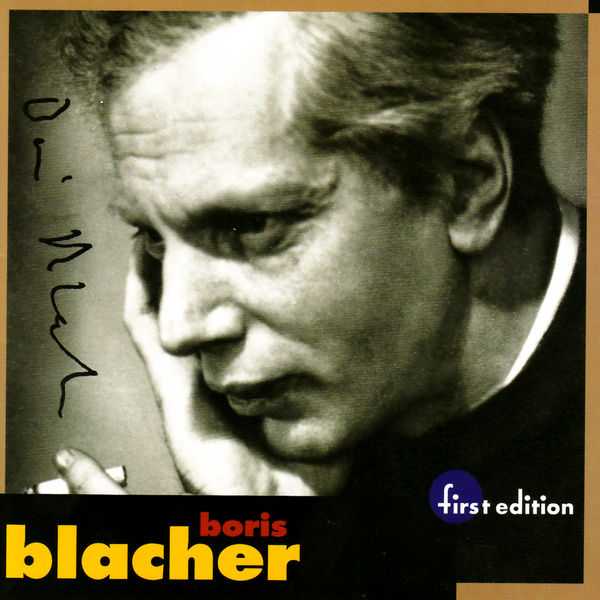
Composer: Boris Blacher
Orchestra: Louisville Orchestra
Conductor: Lawrence Leighton Smith, Robert Whitney
Format: FLAC (tracks)
Label: First Edition
Catalogue: FECD0040
Release: 2005
Size: 254 MB
Recovery: +3%
Scan: cover
01. Orchestral Variations on a Theme by Paganini, Op. 26
Orchestral Ornament, Op. 44
02. Section I
03. Section II
04. Section III
05. Section IV
06. Studie im Pianissimo, op. 45
Orchester Fantasie
07. I. Lento
08. II. Presto
09. III. Adagio
10. IV. Vivace
11. V. Coda
Boris Blacher, like Karl Amadeus Hartmann, was a key figure in the revival of German music in the years following the end of the Second World War. Unlike Hartmann, Blacher did not disdain the use of the twelve-tone system, and worked in his own way to expand its technical resources through his researches into geometric or “variable” configurations of meter. However “technical” his resources may seem on, Blacher was a composer who was heavily impacted by the influence of Paul Hindemith; his music has a vivid and splendidly orchestral quality and always maintains a clear-cut formal design no matter what compositional techniques may be in use. This is one of many reasons why Blacher was in considerable demand as a teacher in postwar Germany.
Blacher enjoyed a special relationship with the Louisville Orchestra; first commissioned in 1953 for the intriguing Studie im Pianissimo, Op. 45, heard here under Louisville’s legendary director Robert Whitney, and the four works on First Edition’s Boris Blacher were recorded in four different decades by three of Louisville’s maestros, the others being Jorge Mester and Lawrence Leighton Smith. While Studie im Pianissimo, Op. 45, was recorded in 1954 and has a tiny amount of tape hiss present, both the piece and its performance are quite compelling. The other recordings were all made in stereo; that of Blacher’s most famous piece, the Orchestervariationen über ein Them von Paganini, Op. 26, was made in 1985. Blacher’s music is involving, vibrant, and cogently rhythmic, easy to grasp, yet never unduly ingratiating; he represents the next step forward from Hindemith, indicating that Hindemith’s style and concepts were not quite the dead end that many took it to be after his own death in 1963. Owing to the comprehensiveness of the program, (though it includes no pre-war Blacher works) and the general excellence of the performances, First Edition’s Boris Blacher can easily be recommended as an introduction to the work of this important and relevant mid-twentieth century German composer.



